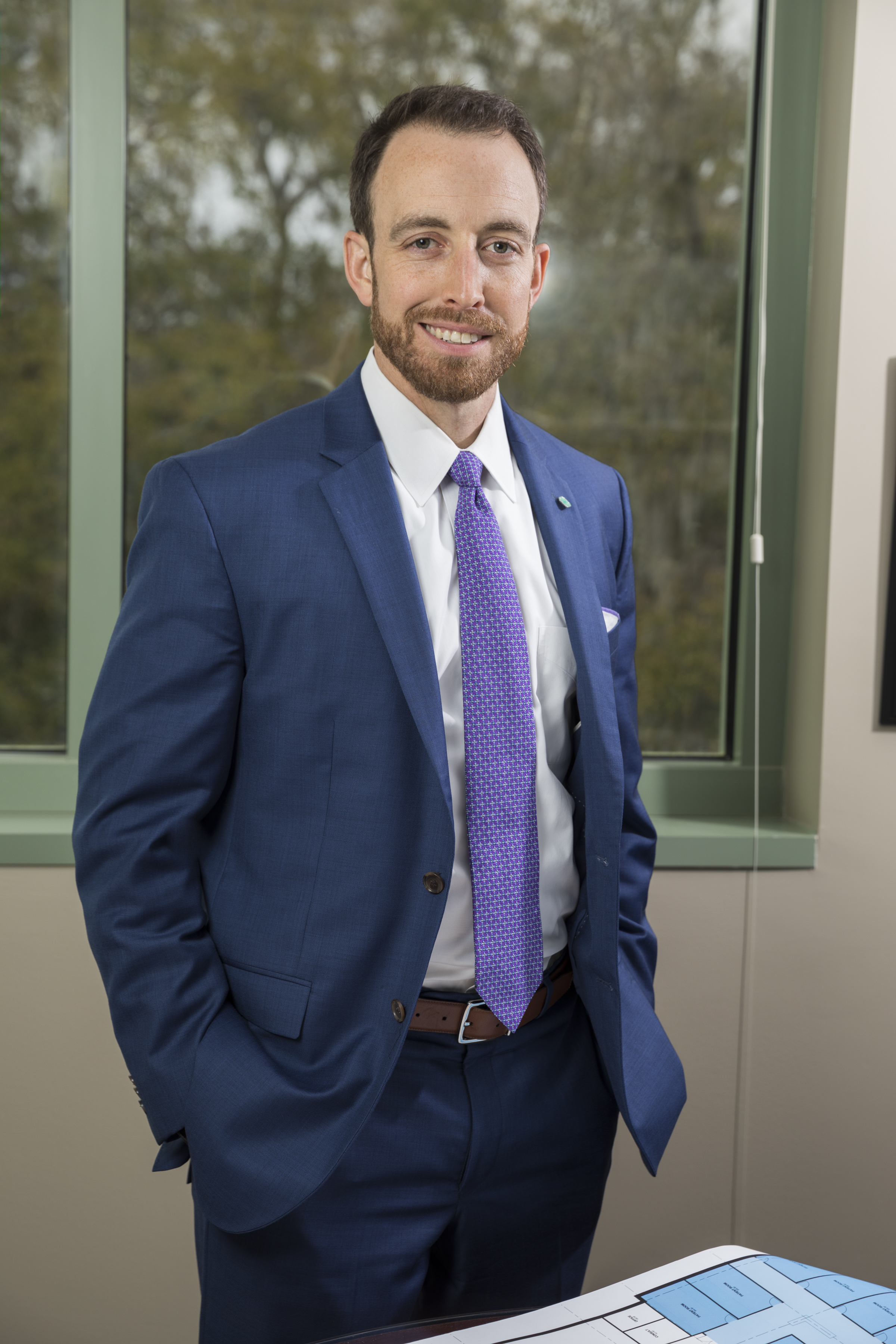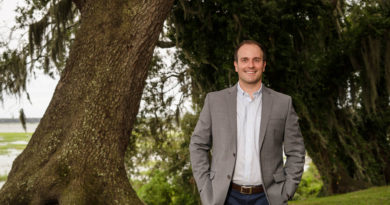Russell Baxley : CEO of Beaufort Memorial Hospital
story by Marie McAden photos by Paul Nurnberg
Three weeks into his new job as president and CEO of Beaufort Memorial Hospital (BMH), Russell Baxley was settled into his office and eager to start work on several innovative initiatives to improve patient care.
Mother Nature had other ideas.
The young hospital administrator was just getting ready to sink his teeth into his burgeoning agenda when Hurricane Matthew began its destructive route up the Southeastern coast.
At first, the plan was to discharge all patients well enough to go home and shelter in place. But when the forecast model showed the Category 4 storm had shifted direction and was making a beeline for Beaufort with a predicted landfall at high tide, Baxley was faced with the difficult choice of riding out the hurricane or closing the 197-bed nonprofit hospital.
The most serious potential issue was a 12-foot storm surge flooding the basement and taking out the hospital’s chilling system and boilers. Concerned for the safety of the remaining patients, many of them in serious or critical condition, Baxley decided to evacuate.
Coordinating with officials from the state’s Department of Health and Environmental Control and a multitude of transportation companies, hospital staff began relocating dozens of patients, including two who were on ventilators and needed to be airlifted out. Many of the patients were accompanied to the receiving hospitals by BMH nurses.
“No one in the hospital had been through a hurricane before,” Baxley said. “It was amazing to watch everyone go into action. In less than 12 hours, we had evacuated 68 patients.”
And Baxley was right there with them in the trenches.
“When the storm hit, he slept in the hospital with the emergency staff,” recalled BMH Board of Trustees Chair Terry Murray. “It created a great sense of camaraderie and team work.”
“Days later, the housekeepers, technicians, doctors and nurses who had been called in to man the hospital during the storm were telling her, “This new guy’s okay.”
For Baxley, it turned out to be a blessing in disguise.
“It was a crash course for me in what our hospital staff could do in the face of extraordinary challenges,” he said. “Working together in a crisis, we got to know each other very quickly.”
At age 33, Baxley was the youngest of seven highly qualified finalists the BMH Board of Trustees considered to replace outgoing president Rick Toomey, who announced his resignation in early 2016.
Despite his youth, Baxley had a depth of experience that was unrivaled. He started his career managing a physician practice and advanced through every critical hospital position, including CEO of a similar-size private hospital in Lancaster, PA.
During his career, he had served as chief operating officer, assistant chief financial officer and director of development in small- and medium-size hospitals in South Carolina and Texas, including Carolina Pines Regional Medical Center in Hartsville. He also served as director of operations and finance for a large family medicine practice and medical spa in Columbia.
“We wanted someone who had vision, but was well grounded,” Murray said. “The more we talked with him, the more we realized he was up for the challenge. Not only could he take us to the next level, he could take us to the level after that.”
More importantly, he had a deep sense of integrity. “He worked for a for-profit hospital, but he embraced the nonprofit mission,” Murray said. “Integrity was at the heart of it.”
A graduate of Clemson University with a B.S. in Microbiology, Russell started out with aspirations of becoming a doctor.
“I always wanted to be in the healthcare field,” he said. “But after four years of undergraduate studies, I decided it wasn’t for me.”
His mother, the controller for Lake City Community Hospital, encouraged him to get a master’s in hospital administration. He took her advice and earned his graduate degree in Healthcare Administration from the University of South Carolina (USC).
Growing up in rural Johnsonville, Baxley developed a strong work ethic, nurtured in the fields of his family’s South Carolina farm.
“My brother, my cousins and I all worked on the farm in the summers and after school, even if we had other jobs or baseball practice,” Baxley recalled. “It was the expectation. The job wasn’t done until it was done.”
The lessons he learned in his youth—the importance of working together as a team and sharing a commitment to a common cause —have served him well as a hospital administrator.
Today, that common cause is to provide the community with access to high quality care.
“We want to expand our footprint, both physically and through technology, to offer our residents health care services where they live, work and play,” Baxley said. “We have to grow, but we need to grow in the right way, making sure we are good stewards of our finances.”
One of his most ambitious initiatives is the creation of South Carolina’s first micro hospital, being planned in Okatie Crossing to serve Bluffton’s growing population. BMH has partnered with the Medical University of South Carolina (MUSC Health) to build the acute care facility adjacent to its planned 60,000-70,000-square-foot medical campus at U.S. 278 and S.C. 170. Construction of the 20-bed micro hospital will begin in June with a completion date set for September 2019.
The micro hospital will include an emergency room, lab and imaging services, In-patient beds and surgical suites. The hospital will focus on multiple specialties to include general medicine, orthopedics, general surgery, cardiology and more.
Baxley also shepherded a joint venture with MUSC and Alliance Oncology to relocate and expand the Keyserling Cancer Center to Beaufort Medical Plaza on the main hospital campus. The three-story building already houses an infusion center, imaging services, breast health center and the office of one of Beaufort Memorial’s two medical oncologists.
By early 2019, the second oncologist, along with radiation oncology services, will be moved to the building from the Keyserling Center.
“Our vision is to provide cancer patients with everything they need in one place,” Baxley said. “We’ll even have office space for MUSC cancer specialists so patients can see them here rather than have to drive to Charleston.”
As part of the project, BMH is investing in the latest radiation technology, including a cutting-edge linear accelerator. The hospital also has applied to the state to open a second radiation oncology center in the Okatie Medical Office building to be developed in conjunction with the micro hospital.
“I always felt that developing an affiliation with MUSC Health was the way to go,” hospital board chair Murray said. “Russell has taken the concept and run with it.”
Beaufort Memorial’s first partnership with MUSC started in 2014 with stroke and pediatric telemedicine. Under the program, BMH emergency room and intensive care physicians can consult with the tertiary medical center’s stroke and pediatric experts on a moment’s notice 24/7.
Recognizing the benefits of telemedicine and the increasing role it will play in the future of health care, Baxley tapped the technology to create BMH Care Anywhere. With the online service, patients can “see” a board-certified urgent care provider anytime, anywhere using their smart phone, tablet or computer.
“Our focus is on improving access to health care,” Baxley said. “We’re doing that by extending hours, expanding into other markets and employing telemedicine in the care of patients.”
With the nationwide shortage of physicians, Baxley expects virtual visits will become increasingly common, especially for primary care.
“Not only does it provide patients with faster access to care,” he said, “it allows us to reach residents in rural areas where there are few doctors.”
In addition to the telemedicine initiatives, Baxley also pushed forward the launch of an online self-scheduling service for nonlife-threatening emergency department visits, cutting down the time patients spend in the ER waiting room. To speed up treatment to patients suffering minor ailments and injuries, the hospital recently opened an express care clinic at 974 Ribaut Rd.
“Russell developed a very ambitious, highly detailed strategic plan when he came to the hospital in 2016,” Murray said, “and he and his team are accomplishing everything we set out to do.”
The hospital executive’s “all-in” approach isn’t reserved just for the workplace. He is equally passionate in his personal life.
A strong proponent of healthy living, he exercises daily, either working out at the gym or running three to 10 miles. He has raced in several half marathons and is currently preparing for The Palmetto 200, a 200-mile team running event from Columbia to Charleston.
And lest there be any doubt, he is a Tiger through and through. His allegiance to Clemson has created some friendly dustups with his wife, Stephanie, a graduate of the University of Georgia.
Several weekends during football season, the couple will make it up to Clemson or Athens to root for their respective alma maters. But on three out of the four road trips, they’re wearing orange and heading to Death Valley.
“She gets the say most times,” Baxley quipped, “but that’s the one argument I always win.”



